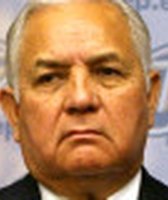Get PolitiFact in your inbox.
GOP Chair Cathie Adams says Bill White gave sanctuary to illegal immigrants as mayor of Houston
Republicans had former Houston Mayor Bill White in their sights well before he won the Democratic nod for governor this month.
In February, Cathie Adams, who chairs the Republican Party of Texas, distributed a fund-raising letter calling White an extreme liberal with the kind of record only a Chicago politician — like President Barack Obama — could admire.
Her letter levels six charges. For this ruling , we're zeroing in on the one that gave us the biggest workout (and we address her other statements in separate Truth-O-Meter items.)
Adams wrote: "Bill White ... offered sanctuary to illegal immigrants."
Who knew? We wanted to learn more.
To back up Adams, the Republican Party pointed us to a report updated by the Congressional Research Service in 2006 that lists Houston among 32 localities -- Austin and Katy were the other two in Texas -- with sanctuary policies. White was about midway through his six years as mayor when the report came out.
Broadly, the report states, so-called sanctuary cities "have their roots in the 1980s religious sanctuary movement by American churches. These churches provided sanctuary to thousands of unauthorized Central American migrants fleeing civil war in their homelands. Most cities that are considered sanctuary cities have adopted a ‘don’t ask-don’t tell’ policy where they don’t require their employees, including law enforcement officers, to report to federal officials aliens who may be illegally present in the country."
The report continues: "Localities, and in some cases individual police departments, in such areas that are considered ‘sanctuary cities,’ have utilized various mechanisms to ensure that unauthorized aliens who may be present in their jurisdiction illegally are not turned in to federal authorities."
The report doesn't state why each locality made the list. Houston's officialdom, including White and Police Chief Harold Hurtt, disputed the characterization, noting there's no city ordinance designating Houston a sanctuary.
A 2007 U.S. Department of Justice report (brought to our attention by White's campaign) said its researchers found only two jurisdictions receiving at least $1 million a year in federal aid to incarcerate "criminal aliens" had official sanctuary policies posted online--California's city and county of San Francisco and the state of Oregon. Harris County, home to Houston, was getting more than $2 million in annual aid at the time; presumably, it was included in the DOJ review.
In short, Houston has no official sanctuary policy.
Still, such a city may have other policies that "interfere or shield people from detection" by U.S. Immigration Customs Enforcement, said Jessica Vaughan, director of policy studies for the Washington-based Center for Immigration Studies, which has done studies on the costs of illegal immigration.
Featured Fact-check
In fact, Houston police do not ask people what their immigration status is during routine patrols. "We have limited resources" and leave it to the federal government to enforce immigration laws, said HPD Assistant Chief Dan Perales.
Houston is in Harris County, whose sheriff, Adrian Garcia, likewise defends the practice of not checking the immigration status of residents who aren't in jail. Garcia said: "You don’t want to create a chill factor. You don’t want people to spend time wondering whether they're going to be asked about their immigration status versus (officers) getting information on the gang member who just shot somebody."
Other cities do the same. Austin Police Department policy states: "Officers will not stop persons for the sole purpose of determining immigration status."
However, Harris County is in a federal program called 287(g) that authorizes local law officers to enforce immigration laws. When Houston police arrest people for crimes more serious than Class C misdemeanors, they are turned over to the county, which was an earlier adopter of the Department of Homeland Security's Secure Communities program. That program enables fingerprints of arrested individuals to be checked against federal crime and immigration databases.
After the shooting of a Houston police officer by an illegal immigrant in March 2009, White asked the federal government to expedite the city’s entry into the 287(g) program, according to The Houston Chronicle. But White shifted course in October, saying that joining the Secure Communities program instead would entail no special agreement with the Department of Homeland Security nor cost as much, the newspaper reported.
The Houston Police Department joined Secure Communities and started using the same databases in mid-December. Perales said they have helped the city identify possible illegal immigrants plus individuals wanted in other states for other reasons. The Houston Police Department joined the Secure Communities program and started using its databases in mid-December. Perales said the data has helped the city identify possible illegal immigrants plus individuals wanted in other states for other reasons.
Vaughan said that because the county and city have stepped up efforts to identify illegal immigrants, she no longer views the city as much of a sanctuary.
Vaughan said in a blog posted Friday, however, that from early March 2008 to Sept. 30, 2009, the Secure Communities program as employed by Harris County failed to identify nearly half the illegal immigrants snagged via the county's 287(g) participation. "Why the difference?" her blog states. "Secure Communities can only flag those aliens whose (fingerprints) or identifying information is already in immigration databases." She writes that the results gap "represents underachievement on a large scale."
None of this proves Adams' claim that White "offered sanctuary to illegal immigrants."
The Congressional Research Service did list Houston among localities with sanctuary policies. Yet the only overt action on White's watch was the decision, at the end of his six years in office, to join the Secure Communities program -- a federal initiative intended to make it harder, not easier, for illegal immigrants to remain in this country.
Whether the White administration's approach helped make illegal immigrants feel at ease in Houston is another question -- and not the one Adams raised.
We rate her sanctuary statement as False.
Our Sources
Austin Police Department, "General Orders, Policies and Procedures, Interviews, Stops and Arrests," received March 10, 2010
Congressional Research Service, "CRS Report for Congress, Enforcing Immigration Law: The Role of State and Local Law Enforcement," Updated Aug. 14, 2006
Congressional Research Service, "CRS Report for Congress, ‘Sanctuary Cities:’ Legal Issues," updated Jan. 9, 2008
The Houston Chronicle, "White steering clear of 287(g) concept," Oct. 7, 2009
Interview, Dan Perales, assistant chief, Houston Police Department, March 9, 2010
Interview, Adrian Garcia, sheriff, Harris County, March 9, 2010
Interviews, Jessica Vaughan, director of policy studies, Center for Immigration Studies, March 9 and 10, 2010
The Houston Chronicle, "Is Houston a Sanctuary for Illegal Immigrants?," Dec. 23, 2007
Republican Party of Texas, "Bill White’s Record," received March 3, 2010
U.S Department of Justice, Office of the Inspector General Audit Division, "Cooperation of SCAAP Recipients in the Removal of Criminal Aliens From the United States," January 2007
Jessica Vaughan, Center for Immigration Studies, "A Tale of Two Programs: Secure Communities vs. 287(g)," blog posted March 12, 2010
Browse the Truth-O-Meter
More by W. Gardner Selby
GOP Chair Cathie Adams says Bill White gave sanctuary to illegal immigrants as mayor of Houston
Support independent fact-checking.
Become a member!
In a world of wild talk and fake news, help us stand up for the facts.











































